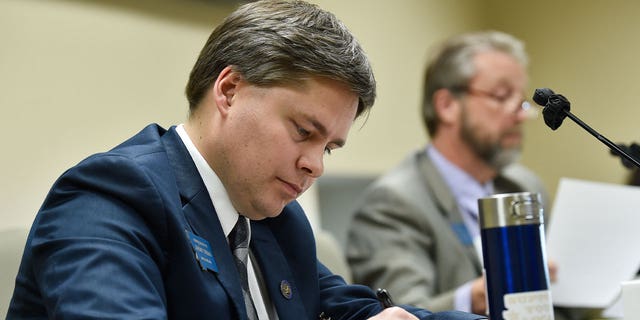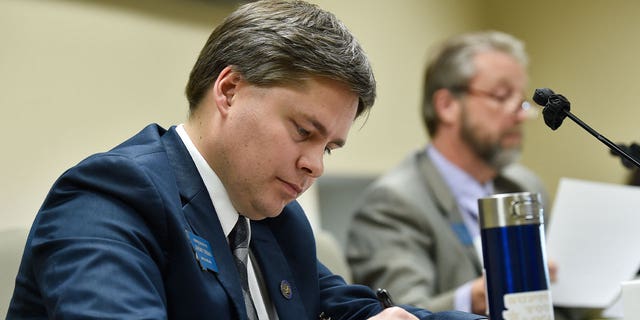
A Republican lawmaker in Montana wants to prohibit mandatory diversity training for state employees with a bill whose language matches a Florida law that is temporarily blocked by the courts.
The proposed “Montana Individual Freedom Act,” would prohibit diversity, equity and inclusion training as a condition of state employment if the training is aimed at having the employee believe that a group of people are responsible for “and must feel guilt, anguish, or other forms of psychological distress,” for historical injustices.
A House committee heard testimony Monday after the Senate passed the bill on party lines.
GEORGIA COP, 19, RESIGNS AFTER SUSPENSION FOR RELIGIOUS POST ON GAY MARRIAGE: ‘DANGEROUS PRECEDENT’
“I find it interesting and confusing that we’re trying to legislate emotional responses,” the executive director of the Montana Human Rights Network, Angelina Gonzalez-Aller, said Monday when she testified in opposition to the bill before a House committee.
“I have no doubts that this is little more than a censorship attempt rooted in a coordinated national effort to roll back progress on racial and social justice,” Gonzalez-Aller had said last month when the bill was heard by a Senate committee.
The sponsor, state Sen. Jeremy Trebas, said that nationally, diversity training is getting too political. He did not suggest that what he considered politically slanted training was taking place in Montana, but that his bill seeks to preempt it.
“I think we need to work on definitions, then talk about what’s appropriate to train and to whom we should be training on these topics,” Trebas said.

Rep. Jeremy Trebas takes notes during a meeting in Helena, Montana, on Jan. 14, 2021. Trebas is sponsoring legislation that would block diversity training for state employees. (Thom Bridge/Independent Record via AP)
The House committee has not yet voted on it.
“This bill is a gross mischaracterization of what is conventionally called DEI, or diversity equity and inclusion workshops,” said Chris Young-Greer with the Montana Racial Equity Project.
“We focus on lifting up what all of us bring to the table with regard to our very different and important backgrounds,” she said Monday. “Diversity is no more than acknowledging differences. Equity means that we all get what we need to be successful. And inclusion means that each of us, no matter our differences, are included, welcomed and accepted.”
Opponents argued the bill’s language is word-for-word in some places like Florida’s challenged Stop WOKE Act passed in 2022.
JAPAN FIRES AIDE FOR ANTI-LGBTQ COMMENTS: ‘OUTRAGEOUS’
Trebas’ original bill was amended to make it clear the discussion of critical race theory as part of academic instruction was allowed — eliminating one of the reasons Florida’s law was blocked. Critical race theory is a way of looking at American history through the lens of race.
Montana’s administrative rules require the Department of Administration to ensure all new employees receive diversity and inclusion, equal opportunity and harassment prevention training within 90 days of being hired. Employees must participate in refresher training every three years.
Attorney Don Harris said the department supports the bill.
The attempt to regulate diversity training appears to have its roots in executive orders issued by then-President Donald Trump in September 2020, after a summer of protests over racial injustice in policing.
CLICK HERE TO GET THE FOX NEWS APP
The first order banned taxpayer dollars from being spent on diversity training for federal employees if the training implies that anyone is racist or sexist based on their race, sex and/or national origin. He later expanded the prohibition to training for the military, government contractors and other federal grantees.
Opponents argued the order prevented workplaces from addressing the concepts of white privilege, systemic racism and unconscious bias.
Trump’s order cited examples of such training, including a presentation by the Smithsonian Institute’s National Museum of African American History & Culture that said, in part: “If you identify as white, acknowledging your white racial identity and its privileges is a crucial step to help end racism. Facing your whiteness is hard and can result in feelings of guilt, sadness, confusion, defensiveness, or fear.”
President Joe Biden revoked Trump’s second executive order on his first full day in office. The U.S. Department of Labor had already suspended the order as it related to federal employees after a federal court in California granted a preliminary injunction against the order.







